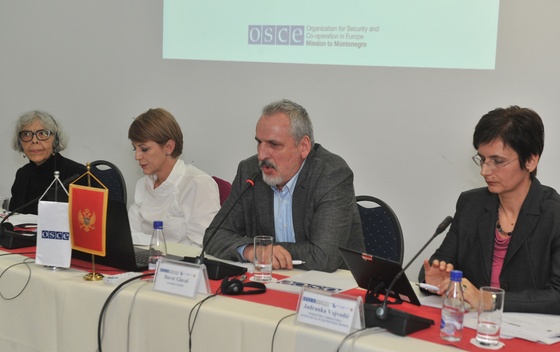
PODGORICA, 26/10/2017 – Increasing the powers of the Agency for Electronic Media (AEM) which would enable to impose sanctions on any breach of the media coverage standards, in a range from an immediate publicising of corrections of inaccuracies or false reporting in media where it occurred, to penalty fees and up to temporary revocation of broadcasting licence, is one of the main recommendations from the OEBS’s Comparative Study: Political advertising and media campaign during the pre-election period.
Political advertising is defined as advertising whose central focus is the marketing of ideas, attitudes, and concerns about public issues, including political concepts and political candidates. The essential task of political advertising is to gain the confidence of the people for their acceptance of ideas and, in the case of political campaign advertising, to influence their vote. What differs political advertising from commercial is the fact that the product is either a person or a set of values not goods and services.
The study was developed in the frame of the project Support to Media Institutions, Information Pluralism, Freedom of Media and Safety of Journalists in Montenegro with aim to assist the AEM in improving the quality of the media legal framework regulating political advertising.
The document states that Election law provides general requirements for the coverage of the election campaign in the media, focusing mainly on the allocation of free airtime. The Electronic Media Law does not specifically regulate election campaign coverage, but provides for general standards of programme content and paid advertisements. In addition, the rulebook of the Agency for Electronic Media (AEM) required news to be presented objectively, accurately and in an impartial manner.
Also it is stated that private broadcasters largely disregarded the legal requirement to adopt and adhere to internal rulebook on campaign coverage based on the principle of equality and that no sanctions were applied for non-compliance.
“Inaccurate or biased reporting is the problem that encompasses the whole media sector in Montenegro, not only the Public Service Media (PSM). Acknowledging the special importance of the PSM in informing the general public, as well the fact that the present PSM self-regulatory mechanisms and internal rulebook do not provide for clear and unambiguous guidelines for covering electoral processes and campaign, a more comprehensive PSM editorial/election guidelines and editorial guidance should be drafted“, states the document.
Political parties are institutions of central importance to electoral democracy. The actions of political parties, their leaders, elected representatives, candidates, constituency associations, paid staff and volunteer members make a significant contribution to the integrity of democracy and democratic institutions, not only in the electoral arena but more broadly within the wider parliamentary and political processes. Therefore in the document it was recommended that political parties should consider adoption of code of conduct during an election campaign.
The study in English is available here.